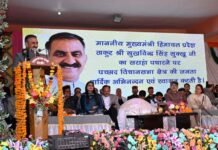Punjab Politics Intensifies Amid Flood Crisis
The political atmosphere in Punjab is charged as leaders engage over the state’s flood disaster and the response by both state and central governments. On September 1, the Finance Minister, Advocate Harpal Singh Cheema, strongly criticized Prime Minister Narendra Modi for not visiting Punjab to assess the devastating floods, labeling the central government’s response as inadequate. He accused the Centre of neglecting the suffering of Punjab’s people, pointing out that the state has been a consistent contributor to national stability and food security. The devastating floods across Punjab have now taken a deeply political turn, with opposition leaders sharpening their attack on both the state government led by Chief Minister Bhagwant Singh Mann and the central government in New Delhi. Allegations of negligence, delayed response, and lack of coordination have dominated the political discourse as thousands of families across Gurdaspur, Pathankot, Kapurthala, Ferozepur, and Jalandhar continue to suffer the consequences of swollen rivers, overflowing dams, and breached embankments.
Opposition parties, including Congress, Shiromani Akali Dal (SAD), and BJP’s Punjab unit, have accused the AAP-led government of focusing more on optics than actual relief measures. Senior Congress leader Partap Singh Bajwa alleged that Chief Minister Mann’s field visits were “more of a media exercise than a substantive relief operation.” He claimed that rescue and evacuation operations were poorly coordinated, with many villages still awaiting basic food supplies and medical assistance despite repeated assurances from the government. The SAD leadership echoed similar criticism, accusing the Mann government of “failing to strengthen embankments and maintain flood channels” before the monsoon peak despite early warnings from the Bhakra Beas Management Board (BBMB). Party spokesperson Daljit Singh Cheema warned that negligence in dam and canal management could have long-term consequences for Punjab’s already fragile agrarian economy. “Farmers are on the brink of total crop loss, and the government’s assurances of compensation mean nothing if the ground reality remains unchanged,” he said.
Adding to the chorus of criticism, the Punjab BJP targeted both the state and central governments, saying the failure lay in their inability to work together in times of crisis. State BJP chief Sunil Jakhar accused the Mann government of downplaying the crisis while also questioning why the Union government had not yet released a special relief package for Punjab. “The Centre is quick to announce aid for other states, but Punjab is being ignored. This selective response deepens the feeling of neglect among Punjabis,” Jakhar said.
Meanwhile, Partap Singh Bajwa, Leader of the Opposition, lambasted both the central government and Punjab’s AAP administration for allegedly abandoning farmers during their hour of need. Bajwa’s remarks echoed widespread anger among agricultural communities who feel betrayed amid huge crop losses and lack of prompt compensation. The situation was further complicated by the return of Rajya Sabha MP Raghav Chadha to the state after a long absence. His presence, especially in flood-affected areas like Gurdaspur and Dinanagar, sparked speculation within the Aam Aadmi Party about a potential change in leadership or increased central involvement. Chadha emphasized the need for relief work and offered to allocate funds from his MPLAD scheme for flood mitigation. Tensions within the AAP have also surfaced, with some party members questioning the effectiveness of both state leadership and the party’s national involvement in Punjab. While Chadha advocated for comprehensive rehabilitation and long-term infrastructure to prevent future calamities, local voices remained skeptical, calling for unity and urgent action.
With disaster management and farmer compensation now primary issues in Punjab’s politics, the flood crisis has become a flashpoint for broader debates about government accountability, inter-party collaboration, and the welfare of Punjab’s rural population.
Meanwhile, ruling AAP leaders defended the state’s response, pointing out that Chief Minister Mann himself diverted his helicopter for rescue operations, while cabinet ministers were camped in flood-hit districts to oversee relief. “The opposition is playing politics over people’s suffering,” said AAP spokesperson Malvinder Singh Kang, adding that the government has already announced compensation for crop losses, cattle deaths, and damaged homes. He argued that Punjab’s scale of crisis was unprecedented and required more support from the Union government.
Experts, however, suggest that the political blame game is widening the gap between what people expect and what they are actually receiving on the ground. While flood rooms continue to function round the clock, relief distribution remains patchy, with reports emerging of stranded families in low-lying areas of Doaba and Malwa waiting for rescue boats. Farmer unions have also entered the debate, staging protests in Kapurthala and Jalandhar to demand immediate financial aid and waiver of electricity bills for flood-affected households.
With the flood situation persisting and more rains forecast, the credibility of both the state and central governments is under severe strain. Analysts note that Punjab’s political atmosphere is rapidly hardening, with the ruling AAP facing growing anger at the grassroots level while the opposition seeks to capitalize on the government’s perceived shortcomings.
What remains beyond doubt is that for thousands of affected families, political sparring offers little solace. Their pressing concerns remain safety, shelter, and survival. If relief and rehabilitation measures do not intensify in the coming days, the erosion of trust in political institutions could become an even deeper crisis for Punjab.
This is a web-generated news report.





